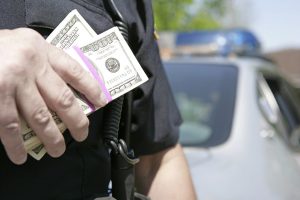Government Property Seizures Continue in New Mexico Despite Laws Designed to Prevent Seizures
A recent police seizure in the City of Albuquerque has brought national attention to New Mexico’s law restricting civil asset forfeiture. Last summer, New Mexico enacted legislation restricting civil asset forfeiture to post-convictions only. Nevertheless, it appears local police departments may be slow in implementing the new legislation.
What is Civil Asset Forfeiture?
Civil asset forfeiture is government seizure of property that is connected to a crime. For instance, the federal government or a state government may take a vehicle connected to a DWI or money related to a bank robbery.
Civil forfeiture should not be confused with criminal forfeiture. Under criminal forfeiture laws, property may only be seized after a criminal conviction. In other words, the government must prove the crime charged beyond a reasonable doubt before taking property connected to that crime. Civil forfeiture, on the other hand, does not require a criminal conviction prior to the government’s seizure. The government need only have a reasonable belief that the property has been used in association with criminal activity. 
It is the property that is on trial in civil asset forfeiture cases, not the individual who committed the crime. As such, the property’s owner might not be the person who engaged criminal conduct. In civil forfeiture cases, the property’s owner has the burden of proving that the property was not connected to the underlying crime. Civil forfeiture laws present constitutional problems since property may be seized and held until the property’s owners can prove innocence. Some states have provided protections for innocent third-party owners, but many states have not. States like New Mexico have begun enacting laws prohibiting forfeitures until after criminal convictions.
The Martinez Family’s Story
The Martinez’s story demonstrates the effects of forfeiture laws on innocent third-party property owners. In this case, Ashley Martinez had a mechanic friend test drive her family’s car to diagnose a transmission issue. Unbeknown to Ms. Martinez, her friend’s license had been revoked for a DWI. The two were pulled over by the Albuquerque police and the car was seized under a local civil asset forfeiture ordinance.
Since civil asset forfeiture was banned by New Mexico, it appears that there have been several instances of government seizure under a local DWI ordinance. In November 2015, the Institute for Justice challenged the City of Albuquerque’s continued seizure of vehicles. The Institute for Justice brought suit in district court on behalf of State Senator Lisa Torraco, an outspoken opponent of civil forfeiture. In May 2016, the court dismissed the case based on standing,a technicality that the Senator was not the proper party to sue. The Institute for Justice is considering appealing the decision and is also exploring other methods to enforce the new forfeiture law.
Will the Institute for Justice be Successful in their Challenge?
Vehicle forfeitures, specifically in the case of DWIs, may be difficult to challenge. The City of Albuquerque argues that the new law does not apply to the local DWI forfeiture ordinance. Albuquerque’s city attorney Jessica Hernandez stated that the “program is a narrowly-tailored nuisance abatement law to protect the public from dangerous, repeat DWI offenders and the vehicles they use.” Since the law is specifically designed for public safety, the court might allow the DWI ordinance to remain.
Continued Enforcement Problems
As the anti-civil forfeiture trend continues, local governments across the United States will likely face similar enforcement issues. Many local governments rely heavily on revenues from civil forfeitures. Local law enforcement agencies generate hundreds of millions of dollars each year from civil forfeitures. The City of Albuquerque alone has generated over $8.3 million from forfeited assets since 2010. The money provides much-needed revenue for underfunded police programs across the country. As in the case of Albuquerque, local governments would likely find legal loopholes to protect this revenue stream.


Comments